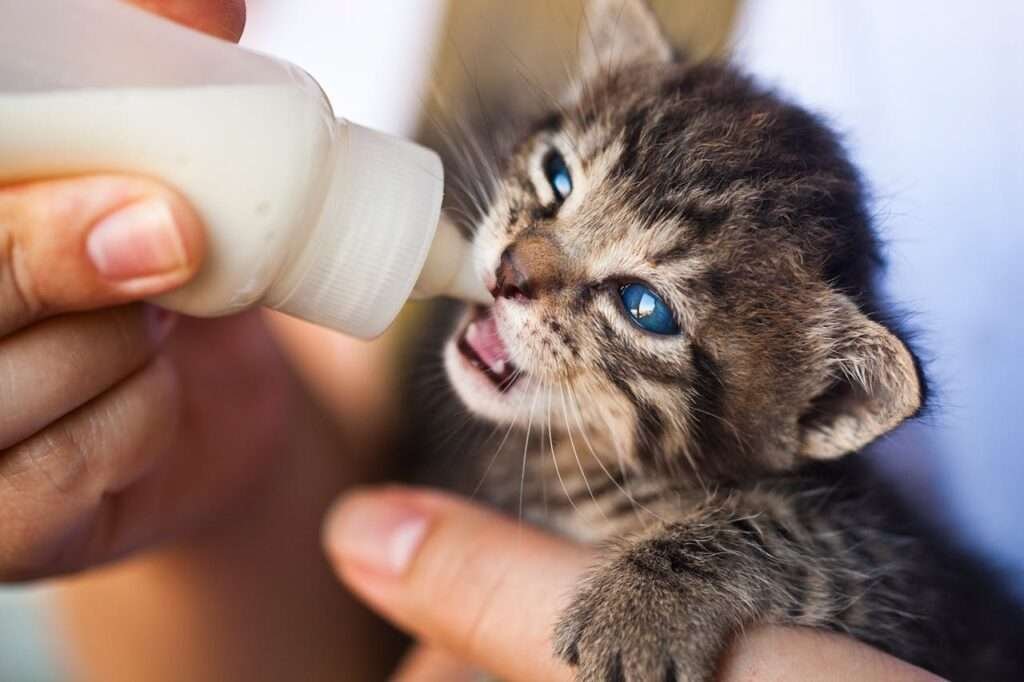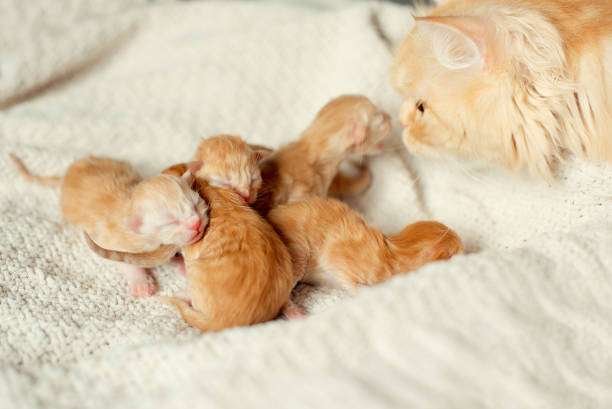I helped a friend of mine raise a newborn kitten. I’m sharing my experience, and I’m confident that you will find the following tips and tricks helpful.
Table of Contents
ToggleNewborn Kitten Care: Feeding Baby Kittens
Feeding newborn kittens must rely mainly on their mother for all their food. They start transitioning to small bites of solid food when they are about four weeks old. The first milk, called colostrum, contains important substances called antibodies that protect kittens from illness. This milk is super beneficial for about six weeks. Kittens can only drink this special milk on the first day or so after birth, so it’s important that they get it within the first few hours.
If a kitten misses this first milk, you should talk to your vet. Baby kittens need to eat every two to three hours. If they drink well from their mother, they will sleep between meals and will not need additional food until they are about three to four weeks old. But if a kitten doesn’t get enough from their mother, they may cry a lot and always look for milk. In this case, it’s a good idea to check with a vet.
Sometimes, small kittens can act upset. They may not sleep, cry a lot, withdraw from their mother, or feel like they are not getting enough attention. It is important to tell the vet if you notice any of these. If the mother cat seems fine, you can weigh the kittens at birth and check their weight daily. They should gain about 10-15 grams per day and should be twice as heavy by two weeks of age.
Generally, newborn kittens weight between 90 and 110 grams. If, for some reason, the mother cat doesn’t want to care for her kittens, or she can’t feed them, you may have to hand feed them. And also remember to clean up after they poop or urinate, or else they might get an infection.
Veterinary care for Kittens
Chat with your vet to determine what kind of care kittens need and when. Your vet may recommend flea and worm treatments for kittens under two days old, depending on how at-risk they are. Vaccination is really important to keep kittens safe from diseases. Be sure to ask your vet when it’s time to start the vaccination process. When kittens are about four months old, it’s a good idea to neuter them. If you don’t do this by then, it’s best to separate the male kittens from the female kittens and the mother to avoid any inbreeding. If you are not sure about the sex of the kittens, your vet can help you.

Hand rearing kittens
If the mother cat does not want to care for some of the kittens, or if she is very sick, you will have to step in and help them.
Kittens Need Help:
- They need someone to look after them day and night.
- Must be in a clean and warm place. If there is no mother cat, a basket with a comfortable bed and a soft toy is good.
- There should be a safe way to stay warm.
- Clean space is essential to stay healthy.
- Eat regularly. Newborn kittens need to eat every two to two and a half hours.
- Need help going to the bathroom before and after every meal until at least three weeks old.
- Since there is no mother cat, don’t hold the baby kitten for too long because during this period, the baby cat’s body is very sensitive.
FAQ: Newborn Kitten Care
Q: How often should I feed a newborn kitten?
A: Newborn kittens need to be fed every 2 to 3 hours. If the mother cat isn’t available, you’ll need to bottle-feed them.
Q: What should I feed a newborn kitten if the mother isn’t around?
A: Use kitten milk replacer (KMR). Avoid giving cow’s milk as it can upset their stomach.
Q: When do kittens start eating solid food?
A: Kittens start to nibble on solid food at around 4 weeks of age. You can mix wet kitten food with kitten formula to help them transition.
Q: How can I keep a newborn kitten warm?
A: Place them in a warm, clean, and safe space, such as a basket with soft bedding and a heating pad set on low, but be careful not to overheat.
Q: What are the signs that a newborn kitten is not getting enough food?
A: Signs include crying a lot, looking for milk frequently, and not gaining enough weight. It’s best to consult a vet if you notice these signs.
Q: How much weight should a newborn kitten gain?
A: A healthy kitten should gain about 10-15 grams daily and double their weight by two weeks old. Weigh them daily to monitor progress.
Q: When should I take a newborn kitten to the vet?
A: Newborn kittens should visit the vet within their first few days for a health check and to discuss vaccinations, flea treatments, and deworming.
Q: What should I do if the mother cat rejects a kitten?
A: If the mother cat rejects a kitten, you’ll need to provide round-the-clock care, including feeding, warmth, and helping them go to the bathroom.
Q: When should I start vaccinating my kitten?
A: Kittens usually need their first vaccinations at about 6-8 weeks old. Your vet can provide the best timeline for your kitten.
Q: How can I help a kitten go to the bathroom?
A: Gently rub their bottom with a warm, damp cloth after every feeding until they are about three weeks old. This helps them urinate and defecate.



